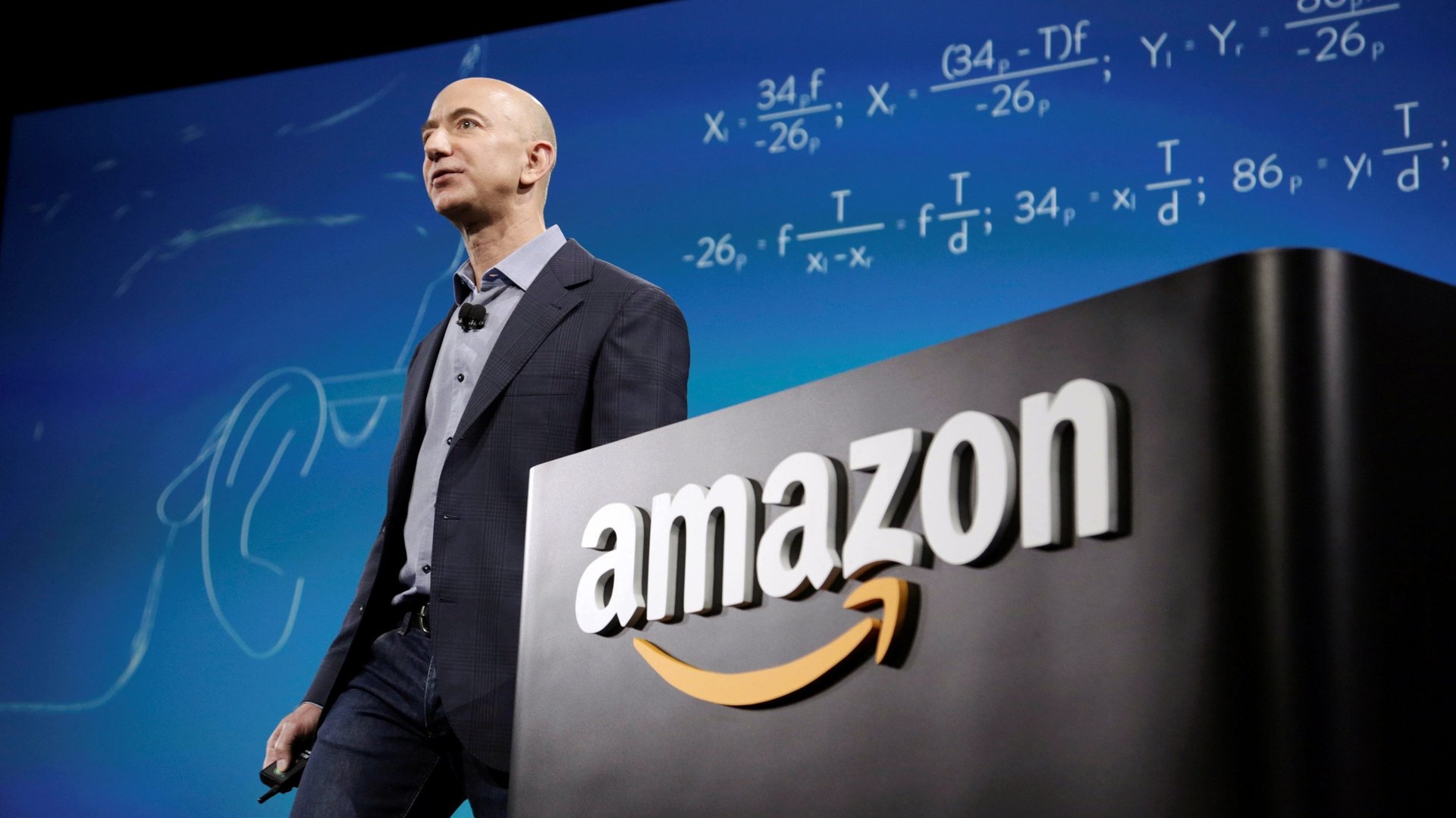Weekend edition—What’s next for Amazon workers, Edgar Snow, Zoom backgrounds
Good morning Quartz readers!


Good morning Quartz readers!
Last week, Amazon warehouse workers in Bessemer, Alabama voted against unionizing by a strong margin. But the union effort still had an impact: In sparking an international conversation about working conditions at Amazon, organizers amped up the pressure on the e-commerce giant to improve its treatment of employees.
In his final annual shareholder letter, Amazon CEO Jeff Bezos wrote that regardless of the vote’s outcome, “we need to do a better job for our employees.” In his new role as executive chair, he said, he will focus on initiatives to make Amazon “Earth’s Best Employer and Earth’s Safest Place to Work”—such as rolling out a new automated scheduling system that will rotate workers through different tasks in an effort to prevent repetitive motion injuries.
That’s a start, but the fundamental question is whether Amazon will alter its work practices to make room for employees’ humanity, rather than seemingly designing its processes around the question of “how do we get people to behave like robots,” in the words of Matthew Bidwell, an associate professor at the Wharton School of Management.
Change doesn’t have to be driven solely by executives and the blue-collar workforce. White-collar workers at places like Google, Facebook, and Amazon itself are engaging in their own forms of collective action, pressuring their employers to evolve on issues ranging from climate change to gender equality. “These tech companies rely on well-paid young engineers with a lot of market power,” Bidwell says. If Amazon engineers are willing to take part en masse in collective actions on behalf of warehouse workers, it “stands to be tricky for the company to be too strident in opposing unionization because there are large swaths of workers who they really can’t live without.”
White-collar types who don’t work at Amazon can also support warehouse workers via social-media campaigns, and even emailing Bezos himself. As Bidwell observes: “The capacity to build some of those cross-class coalitions, I think if the left can pull that off, that’s another lever worth pulling.” —Sarah Todd
Five things from Quartz we especially liked
Our man in Mao’s pocket. Last year, China expelled several journalists and blocked others from entry, but it’s not fair to assume that any correspondent would risk rejection there: The Chinese Communist Party would gladly welcome reporters like late American writer Edgar Snow who, in the 1930s, wrote copy that flattered Mao Zedong and was shaped and edited by the party, as Mary Hui writes. Her deep dive explains why Snow’s name is once again in circulation—even appearing in CCP tweets. —Lila MacLellan, senior reporter
The Chinese social media site cracking down on feminist groups. Jane Li’s story introduced me to the “6B4T” feminist movement, in which women find empowerment in remaining unmarried and child-free and rejecting rigid beauty standards. The Chinese social-media platform Douban is shutting down 6B4T groups because their ideas are deemed too radical—but as Li explains, the censorship is only attracting more attention to the movement’s ideas. —Sarah Todd, senior reporter
Deadly by design. According to the police, the officer who shot and killed Daunte Wright, an unarmed Black man, did so by accident—drawing a gun, instead of a Taser. But can these two objects really be confused? In her detailed analysis, Anne Quito looks both at all the significant differences between the two objects, while highlighting all the design failures that make it possible to accidentally shoot one instead of the other. —Annalisa Merelli, reporter
A roadmap to universal healthcare. The Covid-19 crisis forced the federal government to take emergency measures, like guaranteeing free access to tests and vaccines and subsidizing hospital visits for the uninsured. Katherine Foley breaks down how the country could expand that model in normal times to reduce US healthcare costs without sparking a backlash from a scorned industry of private insurers and healthcare providers. —Nicolás Rivero, tech reporter
African artists in demand. Fueled by a young population, great musical talent, and more streaming opportunities, Africa’s music industry is booming. Carlos Mureithi interviews executives at Universal Music Group and Warner Music Group to learn more about their expansion strategies, and the industry’s growth potential. —Jackie Bischof, talent lab editor
One membership thing that made us 🤭
A by-the-digits look at the air you’re most likely breathing right now:
2.5 microns: A commonly-measured size of particles that make up fine particulate matter (PM2.5), which, when inhaled over time, are the most damaging to human health
98%: Share of cities of more than 100,000 inhabitants in low- and middle-income countries where the air exceeded the WHO’s recommended levels of PM2.5 in 2016
56%: Share of cities of more than 100,000 inhabitants in high-income countries where the air exceeded the same recommendations
6-8: Air changes per hour (a metric for ventilation) recommended in an office
0.35: Air changes per hour in a typical home
1.3: Maximum air change per hour in a home with a window open
✦ Read more about the air you breathe, which plays a surprisingly large role in human health—pandemic or no—in our latest field guide. Need a membership? Take a deep breath, and try it for a week.
We’re obsessed with Zoom backgrounds

Your life in the foreground. Originally conceived as a privacy shield for remote workers, Zoom backgrounds reveal a wealth of information about people’s sensibilities. Sure, there are gaffes and blunders, but that’s part of the joy of giving everyone free rein over their self-presentation.
As we mark a year of remote work, some organizations are trying to regulate the look of virtual communications. The Quartz Weekly Obsession is definitely not judging your surroundings.
Get the Weekly Obsession email sent to your inbox, for free!
Five things from elsewhere that made us smarter
Can’t focus; can’t think; can’t remember. I’ve got a serious case of brain fog—and it’s likely you do, too. A year of uncertainty combined with a lack of stimulation and human interaction has meant an uptick in memory impairment, loss of attention span, and just generally poor cognitive function. For the Guardian, Moya Sarner explores the cause and consequence of this common, but complex, mental sluggishness. Ultimately, the future looks sunny; the fog should lift as normalcy returns. —Amanda Shendruk, Things reporter
The fight to eradicate racist language from computing. You think it’s hard to get your coworkers to agree on something? Try being a part of the Internet Engineering Task Force, which relies on consensus to set standards for the internet. The latest fight, over racist terminology like master/slave, is an indication of “the intractability of racial issues in society,” writes Kate Conger in the New York Times. —Alex Ossola, membership editor
The climate divestment loophole. More and more major oil companies are setting long-term carbon emissions reduction targets—but one key strategy is to simply sell high-pollution assets to small private drillers. It may make the company’s balance sheet appear greener, but the emissions haven’t gone anywhere. In fact, as Rachel Adams-Heard reports for Bloomberg, the divestment loophole could actually drive emissions up by putting them in the hands of less responsible companies. —Tim McDonnell, climate and energy reporter
Who gets medical parole? For some inmates in Massachusetts’s prison system, the mismanagement of hygiene and safety during the Covid-19 pandemic made them eligible for a last-resort parole release typically reserved for those whose deaths are imminent: medical parole. For STAT, Eric Boodman details how the state’s department of corrections tried to misuse laws meant to show compassion to unwell inmates to lower the number of Covid-19 deaths in their own prison system. —Katherine Ellen Foley, science and health reporter
Eyes in the skies. Unidentified Flying Objects spotted by US military pilots have been publicized in recent years alongside unfounded speculation about extraterrestrial visitors to Earth, egged on by dark hints from former government officials. The Drive’s Tyler Rogoway dives into the mass of evidence to offer a different hypothesis: Many of these incidents are in fact evidence of geopolitical rivals using drones to gather intelligence over the US, something the defense establishment is loath to admit is possible. —Tim Fernholz, senior reporter
Our best wishes for a relaxing but thought-filled weekend. Please send any news, comments, brain fog stories, and Cat Lawyer impressions to [email protected]. Get the most out of Quartz by downloading our app and becoming a member. Today’s Weekend Brief was brought to you by Susan Howson.